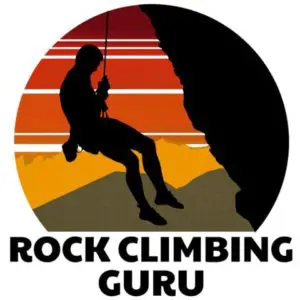Finding the right climbing harness can seem like an overwhelming experience – especially when it comes to picking out the right price point. This article lists some of the most popular climbing harnesses at different costs.
On average, climbing harnesses cost between $50 and $200. Quality, brand, and features all affect how much a climbing harness costs. As a general rule, beginner harnesses suited for all-around climbing will be less expensive than specialized harnesses designed for specific climbing types.
Price is not the only factor to consider when picking out a climbing harness. Just because a harness is more expensive than another does not mean it is better suited for what you are looking for. This article discusses what makes some harnesses more expensive than others and gives you an idea of what to look out for.
To check out what I think is the best climbing harness for the money check out my recommended gear page linked here.
15 Popular Climbing Harnesses with Price
Climbing harnesses are one of the most essential pieces of climbing gear along with climbing shoes. Getting the right harness is essential as you will be climbing in it for years to come. The table below lists the cost of 15 popular climbing harnesses.
| Climbing Harness | Harness Type | Price (new) |
| CAMP Energy CR-3 | All-Around | $50 |
| Black Diamond Momentum | All-Around | $65 |
| Petzl Sama | All-Around | $70 |
| Black Diamond Solution | Sport | $75 |
| Petzl Adjama | Trad/Multi-pitch | $80 |
| Black Diamond Technician | All-Around | $90 |
| Mammut Nordwand | Sport | $100 |
| Black Diamond Big Gun | Big Wall | $130 |
| Metolius Safe Tech | Trad | $130 |
| Petzl Aquila | Sport/Trad | $135 |
| Arc’teryx C-quence | All-Around | $145 |
| Black Diamond Air Net | Sport | $160 |
| Arc’teryx AR-395a | All-Around | $160 |
| Misty Mountain Titan | Big Wall | $190 |
| Petzl Sitta | Sport | $200 |
As detailed in the table above, there is quite a large range for climbing harness prices. It is essential to understand what makes harnesses more expensive than others. If you don’t, you will end up paying extra money for potentially irrelevant features. The next section discusses in detail what separates the different harness price points.
What Makes A Harness More Expensive
Climbing harnesses cheaper than the ones listed in the table above are generally very low quality and do not come with any features. These cheap harnesses are commonly found as rental harnesses in climbing gyms. They get the job done but are by no means a good harness to invest in for yourself.
It should be noted that climbing harness price does not reflect how safe the harness is. All climbing harnesses must meet the safety requirements as laid out by the International Climbing and Mountaineering Federation (UIAA). If you are interested in these safety standards, you can check them out at the UIAA website linked here.
The price of a climbing harness is directly affected by the features it comes with, the quality of the harness, and the brand name of the manufacturer. These three factors are the main determining components that determine the cost of a climbing harness.
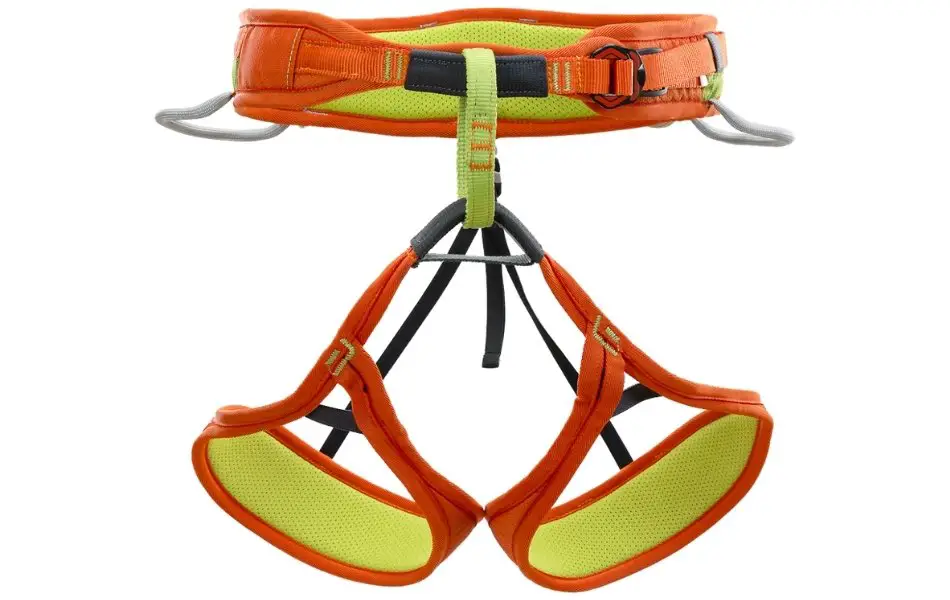
Features and Specialization
Harnesses that are more specialized and tailored to a specific type of climbing are generally more expensive than an all-around harness. Typically, rock climbing harnesses will be specialized to be better for trad, big wall, or sport climbing.
Sport Climbing
Sport climbing typically involves climbing hard grades and generally does not require a lot of gear. To address this, sport harnesses are designed to be light weight and not have a ton of space for gear. Typical sport harnesses will have two gear loops, minimally adjustable leg loops, and be made of a light material.
Higher-end (more expensive) sport harnesses will prioritize saving weight and may sacrifice comfort to do so.
Trad Climbing
Trad climbing requires a lot of gear and a longer time on the wall than sport climbing. To address this, trad harnesses will have more features than sport harnesses. These features typically include adjustable leg loops, additional padding for comfort, and extra loops. Typical trad harnesses will have 4 or more loops to carry gear.
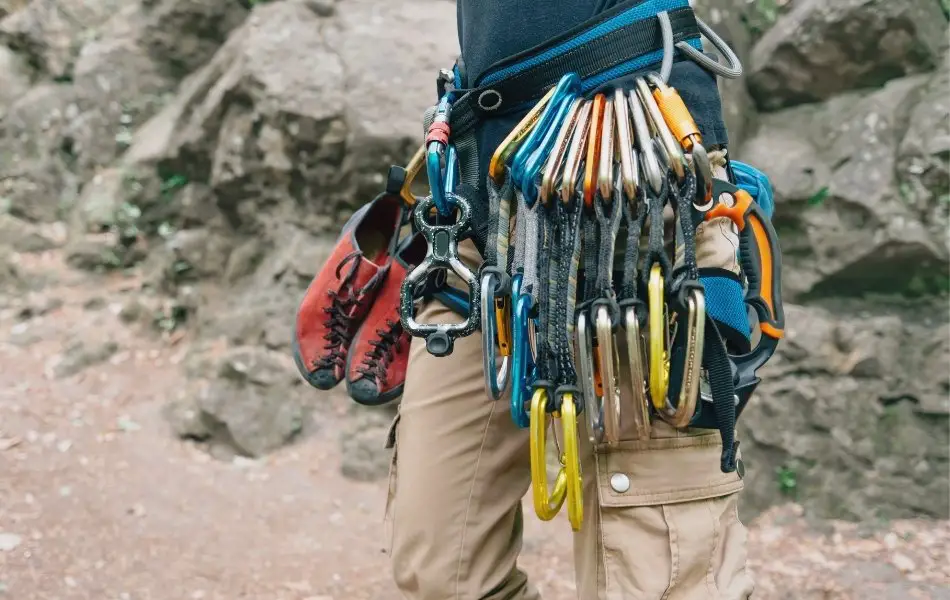
Higher-end trad harnesses will prioritize comfort along with gear space. These harnesses are more comfortable, adjustable, and have more space than sport harnesses but are also much heavier.
Big Wall Climbing
Big wall climbing requires the most gear of the three types and also the most time on the wall. To address this, big wall harnesses will have the most features. These features typically include 6 or more gear loops, extra wide padding, and two belay loops. Big wall harnesses are the most comfortable but the heaviest of the options.
Higher-end big wall harnesses prioritize comfort to accommodate the long hours hanging on the wall.
Other specialized climbing harness types include alpine/mountaineering, ice climbing, and canyoneering. I believe these types are generally considered to be separate topics from “rock climbing” specifically which is why I did not dive deep into them in this article.
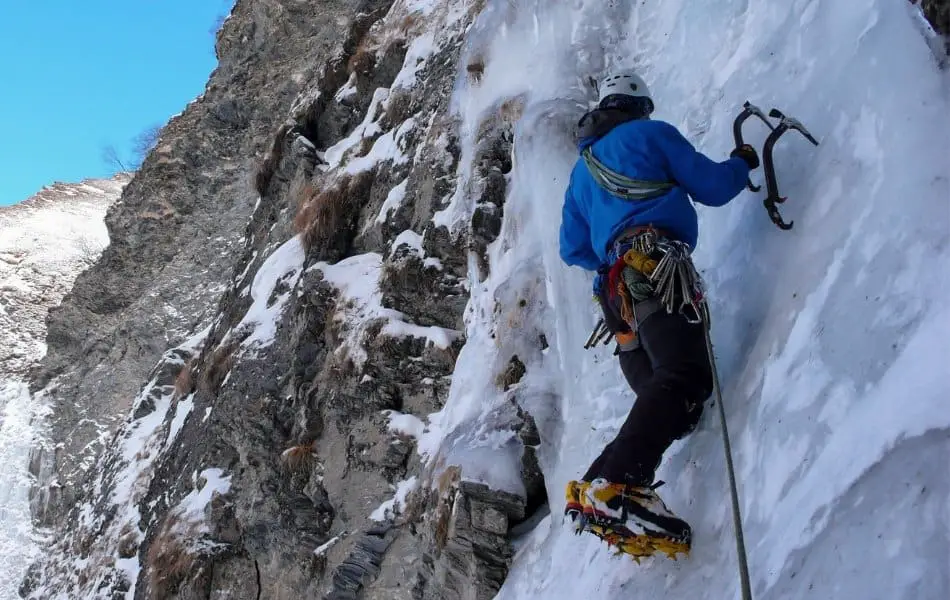
Quality
The climbing harness material is the biggest determining factor of its quality. Higher quality climbing harnesses will typically be made out of lighter and/or more durable material than cheaper harnesses. For example, high-end sport harnesses are designed to save every ounce possible and are therefore made out of ultra lightweight materials.
Cheap climbing harnesses are made out of low-quality material (like the rental ones found at a climbing gym). This cheap material will cause the harness to typically be heavier and way less comfortable than a higher quality harness.
Brand Name
Large brands like Black Diamond and Petzl are able to charge a little bit extra for their products. The climbing community recognizes these companies for creating high quality climbing equipment. As such, their name carries a reputation that allows them to charge a little bit extra.
In the grand scheme of things, the slight up-charge for the brand name does not inflate the price of their climbing harnesses too much. Brand name is probably the most minor factor that influences the cost of climbing harnesses.
Which Type of Harness is Right For You
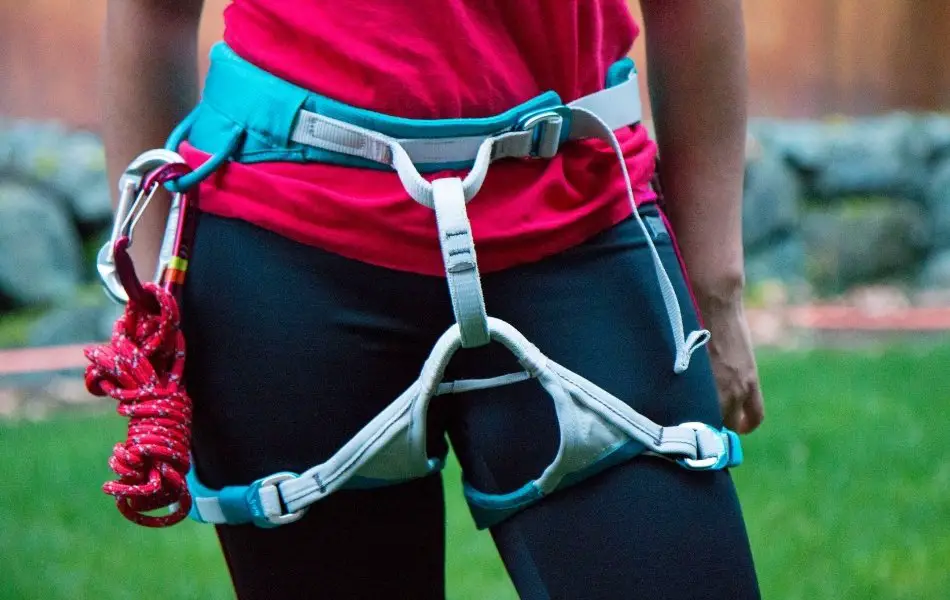
If you are looking for your first harness I recommend getting an all-around starting harness. These harnesses are not designed to be fantastic for any single type of climbing but are good for many different climbing types. This harness type will allow to comfortably climb anything you want when first starting.
I think it is worthwhile to go with a larger brand for your first harness until you know what you are specifically looking for. Although the larger brands can up-charge a little bit, they make high-quality all around harnesses for reasonable prices.
Getting a really cheap harness for your one will save money but it will also be uncomfortable and detract from your climbing experience. Prioritizing comfort will be well worth it in the end.
The Bottom Line
A decent climbing harness to get you started will generally cost between $60 and $90. I do not recommend getting a harness too much cheaper than this as the harness quality will start to suffer greatly below $50. Unless you are looking to start trad, big wall, or competition sport climbing, harnesses above $120 generally won’t be worth your money.
